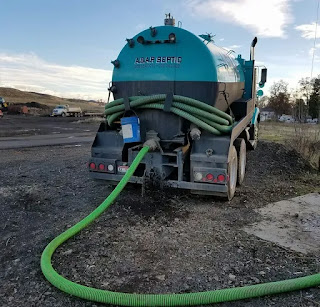Septic Systems and Heavy Rains in Boise, ID
Last spring, we were blessed with an abundance of rainfall after several years of drought. We were delighted to see our reservoirs and water tables replenished, but realize that new septic owners may not recognize potential issues that can arise as a result of abundant rainfall. One of the main functions of a septic tank is to allow excess wastewater to seep out of the tank and into the ground, and heavy rains can saturate the ground, slowing down septic systems and exacerbating mild issues. Clogging, flooding, and raw sewage leakage are all potential problems, all of which can lead to health hazards in addition to the headache and stress such issues bring. Some signs you should be aware of include:
Pooling water: be aware of where your drain field is located. The drain or leech field is a term that describes the area on your property where a network of perforated pipes allows wastewater to seep into the ground. Pooling water indicates that the ground is oversaturated, and can be a result of heavy rains combined with normal wastewater usage.
Slow drains: a classic sign of a clog, drains taking excessive time to carry water away, especially during or after abundant rainfall, can be a red flag indicating it’s time to get your drains cleaned or otherwise examined. While some clogs may dislodge themselves, the majority will go away without being cleared, either by hydrojetting or another method.
Bubbling or gurgling noises: the inner surfaces of pipes should be smooth and allow water to flow with no interruption. Bubbling and gurgling noises can indicate clogs forming on the inner walls of your pipes, or can even be your septic tank bubbling after a heavy rain.
If you see any of these signs, especially after heavy rains, the first thing to do is to call a professional for a septic inspections! ASAP Septic offers 24-hour emergency septic services, so we are on call to help with any emergencies you may experience, whether related to the weather or not. We know how stressful it can be to experience septic and sewer troubles, and we are dedicated to helping resolve your problems quickly and efficiently. In addition to performing any repairs your system may need, we will always check to ensure that your septic system is clear of the debris that sometimes infiltrates the system with heavy rains, which can help prevent future issues.
Perhaps the best way to prevent large issues and emergencies is to maintain your septic system on a regular basis. Depending on the number of people in your household and the amount of wastewater produced, we typically recommend getting your septic tank pumped every 2-5 years. Additionally, it’s good practice to prevent damage or excess water flow to your drain field. For example, avoid driving or allowing construction vehicles to drive over your drain field, as compacting the soil restricts drainage and can slow down your septic system. Keep an eye out for broken sprinklers that may cause flooding in the area, and ensure that rain gutters and spouts don’t empty into the drain field. If your septic system is in peak condition, you can rest assured that all will go smoothly this coming spring, and if any new issues arise, you can always call our team of experts at ASAP Septic. We serve Boise, Payette, Middleton, Mountain Home, and areas throughout southeast Idaho. For more information, fill out our online contact form or give us a call at (208) 991-7184 today.




Comments
Post a Comment